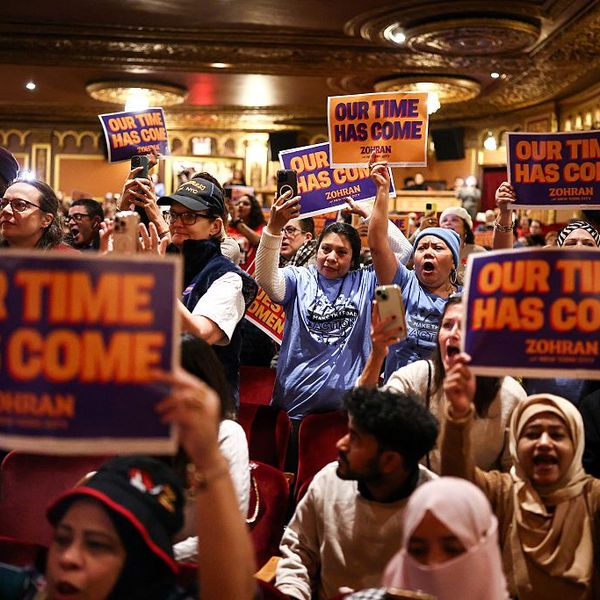New Yorkers like to think of their home town less as a city than as a nation unto itself. They refer to the country in which they reside as little more than a geographical accident of little relevance. "I don't live in America," they'll tell you. "I live in New York."It's not difficult to see why. New York is an impressive and distinctive global city. It moves like a disco without the music - the aficionados try to stick with the rhythm but so long as you're into it nobody much cares. For a European visitor it has more in common with London, Paris or Rome than it does with Phoenix, San Antonio or San Jose, which are among America's 10 largest cities.
Long the nation's primary portal to the rest of the world, it is the Dominican Republic's second largest city, home to more Italians than Palermo, and more Irish than Galway and Cork combined. It's the city people come to make it in and, ostensibly, only leave because they have failed. "When you leave New York," goes the saying, "you ain't goin' nowhere."
Politically, the last seven years have made New Yorkers feel particularly estranged from their fellow Americans. With three quarters of them voting for John Kerry in 2004, they discuss what has been going on in the rest of the country as though Ohio and Florida were foreign states. In some ways, they almost pride themselves on being out of touch.
But judging by presidential primary races, New Yorkers might be disappointed to discover they are not quite as different as they would like to think. The frontrunners for both the Democratic and Republican nominations - Hillary Clinton and Rudolph Giuliani - both have their campaigns based here. Giuliani was the city's mayor from 1994 to 2001; since 2000 Clinton has been the senator for the state - a disparate, more conservative entity than the city, but the farther you are from the Hudson, the more that becomes a distinction without a difference. Even the possibility that they may face off against each other in 2008 raises some serious challenges to the conventional wisdom that has dominated American political thinking over the last seven years.
If Bush's victory illustrated a nation polarised between the heartlands and the coasts, how is it that two candidates most identified with the city that most symbolises one of those poles could hold such sway nationally? If values and morality were so central to Bush's victory, why are two pro-choice, pro-gay candidates who are both lukewarm on guns and immigration control, doing so well from Iowa to South Carolina? In short, if New York is different, why are agendas and candidates that have proved so popular here doing so well elsewhere?
Part of the answer is in the candidates themselves. Both are from their party's centre and neither were inculcated in partisan dogma. As a teenager Clinton volunteered for the most conservative post-war Republican presidential candidate, Barry Goldwater, in 1964. Eight years later Giuliani backed the most liberal post-war Democratic candidate, George McGovern.
Clinton may be the senator for New York state but in the public imagination she is from a land called Politics. Home for the Clintons is pretty much wherever they can legislate from. She has spent more time in Arkansas and the White House than she has in New York.
The Democratic base is comfortable with her New York credentials, but for independents it may be a drawback. "She's carrying huge negatives out here," a Colorado pollster, Floyd Ciruli, told the Los Angeles Times. "It's that liberal east coast image that is so hard to sell in the west." Hence her emphasis on midwestern roots: "I grew up in a middle-class family in the middle of America in the middle of the last century," goes the stump speech.
Things are tougher for Giuliani. Thrice married with two estranged children, he has a much harder job selling himself to a base dominated by Christian conservatives. In August in New Hampshire he was asked by one woman why he should expect loyalty from the voters when he does not even command it from his own children (his daughter has indicated she might support Democratic hopeful Barack Obama). Giuliani shot back: "The best thing I can say is kind of, 'leave my family alone, just like I'll leave your family alone'."
Unable to run away from New York - his brash swagger is too much of a giveaway - he instead pulls it close like a bear hug, pushing his success in fighting crime and "turning the city round".
But central to Giuliani's candidacy is his identification not with a place but a day - 9/11. His performance in the immediate aftermath of the terrorist attacks is what earned him the title "America's mayor", Time's Person of the Year and 78% approval ratings even a year later. That was when, in the public mindset, he went from being a New Yorker to a full-blown American. His success will depend on how much conservatives will trade his social liberalism for his statist authoritarianism.
But beyond the candidates is the fact that New York is nowhere near as liberal or as different as most New Yorkers would like to believe. One of the problems of the conventional wisdom of the past few years is that it has mistaken an ideological divide for a geographical one. The nation's not divided into red (for Republicans) and blue (for Democrats) but is a blur of purple. Its faultline was never values but security.
In 2004 Bush did better in Staten Island (one of the city's five boroughs) than he did in Houston. According to the census, New York is more residentially segregated than New Orleans and poverty rates in the Bronx and Brooklyn are higher than in Mississippi or West Virginia. A recent New York health department report showed that one in six adult New Yorkers do not have health insurance - in line with the national average. New York has a moderate Republican mayor; Salt Lake City, in the most conservative state in the country, has a radical Democrat.
New York is far more in lockstep with the rest of the nation than it admits for good reason - its livelihood depends on it. Bush's economic policies, which have been the scourge of liberal America, have most benefited, and in no small part been executed by, Wall Street. As the national centre for the commerce, publishing, advertising and broadcasting industries it sells goods, images, narratives and desires to the rest of the country. "New York has always been where America happens first," wrote Kevin Baker in Harper's magazine last month. "As the nation's most populous city, as its financial and intellectual capital, and as a magnet for ambitious and creative immigrants from all points, domestic and foreign, it has set the course for most of the nation's history."
Maybe. But it's not where America ends. If New York sets trends it also follows them. The impressive architecture and museums provide shade for a corporate takeover. With a Starbucks on every corner and a Gap nearby, Manhattan may look different but it feels much like everywhere else in the country. Wal-Mart has yet to arrive. But its theatrical equivalent is already here. Broadway used to show 200 original shows a year; now it mostly sets Disney to music. New York is more in tune with the rest of the country than it's ever been.
Gary Younge, the Alfred Knobler Journalism Fellow at The Nation Institute, is the New York correspondent for the Guardian and the author of No Place Like Home: A Black Briton's Journey Through the Deep South (Mississippi) and Stranger in a Strange Land: Travels in the Disunited States (New Press).
(c) 2007 The Guardian

